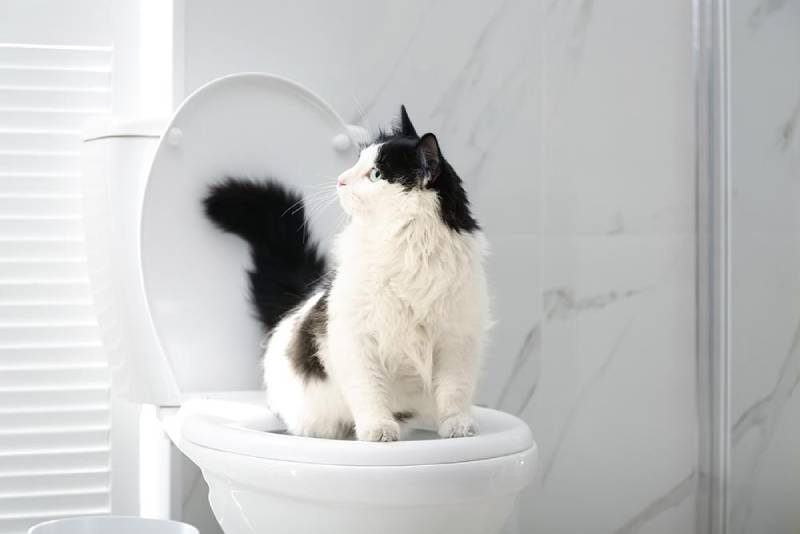Prevent Plumbing Problems: Don't Flush Cat Poop Down Your Toilet - Professional Advice
Prevent Plumbing Problems: Don't Flush Cat Poop Down Your Toilet - Professional Advice
Blog Article
The content which follows relating to How to Dispose of Cat Poop and Litter Without Plastic Bags is especially motivating. You should look it over.

Intro
As feline owners, it's vital to be mindful of how we deal with our feline friends' waste. While it might seem hassle-free to purge feline poop down the commode, this practice can have detrimental effects for both the environment and human wellness.
Alternatives to Flushing
Luckily, there are more secure and much more accountable means to dispose of pet cat poop. Think about the adhering to alternatives:
1. Scoop and Dispose in Trash
The most typical approach of disposing of pet cat poop is to scoop it into a naturally degradable bag and throw it in the trash. Be sure to utilize a dedicated litter scoop and deal with the waste promptly.
2. Usage Biodegradable Litter
Select naturally degradable cat clutter made from materials such as corn or wheat. These trashes are eco-friendly and can be safely taken care of in the garbage.
3. Bury in the Yard
If you have a lawn, take into consideration hiding cat waste in a designated location far from vegetable gardens and water sources. Be sure to dig deep enough to stop contamination of groundwater.
4. Set Up a Pet Waste Disposal System
Invest in a pet waste disposal system particularly designed for cat waste. These systems utilize enzymes to break down the waste, lowering odor and ecological impact.
Health and wellness Risks
In addition to ecological issues, purging cat waste can likewise position wellness threats to people. Feline feces might consist of Toxoplasma gondii, a bloodsucker that can trigger toxoplasmosis-- a possibly serious ailment, particularly for expectant ladies and individuals with weakened immune systems.
Environmental Impact
Purging cat poop introduces harmful virus and parasites right into the water, positioning a substantial risk to water ecological communities. These impurities can adversely impact marine life and concession water quality.
Final thought
Responsible pet dog ownership extends beyond supplying food and shelter-- it likewise includes correct waste management. By refraining from purging cat poop down the toilet and going with different disposal techniques, we can minimize our ecological impact and safeguard human health.
Why You Should Never Flush Cat Poop Down the Toilet
A rose by any other name might smell as sweet, but not all poop is created equal. Toilets, and our sewage systems, are designed for human excrement, not animal waste. It might seem like it couldn’t hurt to toss cat feces into the loo, but it’s not a good idea to flush cat poop in the toilet.
First and foremost, assuming your cat uses a litter box, any waste is going to have litter on it. And even the smallest amount of litter can wreak havoc on plumbing.
Over time, small amounts build up, filling up your septic system. Most litter sold today is clumping; it is made from a type of clay that hardens when it gets wet. Ever tried to scrape old clumps from the bottom of a litter box? You know just how cement-hard it can get!
Now imagine just a small clump of that stuck in your pipes. A simple de-clogger like Drano isn’t going to cut it. And that means it’s going to cost you big time to fix it.
Parasitic Contamination
Believe it or not, your healthy kitty may be harboring a nasty parasite. Only cats excrete Toxoplasma in their feces. Yet it rarely causes serious health issues in the cats that are infected. Most people will be fine too if infected. Only pregnant women and people with compromised immune systems are at risk. (If you’ve ever heard how women who are expecting are excused from litter cleaning duty, Toxoplasma is why.)
But other animals may have a problem if infected with the parasite. And human water treatment systems aren’t designed to handle it. As a result, the systems don’t remove the parasite before discharging wastewater into local waterways. Fish, shellfish, and other marine life — otters in particular — are susceptible to toxoplasma. If exposed, most will end up with brain damage and many will die.
Depending on the species of fish, they may end up on someone’s fish hook and, ultimately on someone’s dinner plate. If that someone has a chronic illness, they’re at risk.
Skip the Toilet Training
We know there are folks out there who like to toilet train their cats. And we give them props, it takes a lot of work. But thanks to the toxoplasma, it’s not a good idea.

Hopefully you enjoyed reading our post about Don’t flush cat feces down the toilet. Thanks a lot for taking a few minutes to read our article. Sharing is caring. One never knows, you may very well be helping someone out. Thanks for your time spent reading it.
Get Offer Report this page